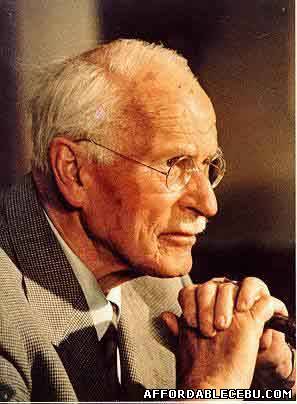
Picture of Carl Jung
I. BACKGROUND
Carl Jung was a Swiss psychoanalyst and founder of Analytical Psychology (1875-1962). Jung was educated in the schools of Basel and at the University of Basel, where he obtained his M.D. degree in 1900. Jung then studied with Janet in Paris and in 1906 became a member of Freud’s circle. However, Jung eventually disagreed with Freud over the nature of the libido and the unconscious and, in 1913, broke away from Freud to found his own school of Analytical Psychology. Because Jung believed that the study of the racial unconscious could add to a man’s understanding of the individual unconscious, he became interested in the study of the primitive peoples of the world – in their myths, religions, folkways, and mores.
II. THEORY SYNTHESIS
Jung’s Analytical Psychology was originally modeled after Freud’s psychoanalysis. However, Jung presented his new interpretation of the libido. The libido, according to Jung, is the general life energy of "life urge,” and this primal energy is not, as Freud had argued, necessarily manifested as the sexual drive; it may show itself at one time as sexual energy, at another as a creative or artistic form of behavior, or in still another setting as a striving for superiority. The psychological process by which libidinal energy is transformed into cultural activities is the symbol. Symbols emerge in the unconscious part of the psyche. Some of these belong to the primitive, collective unconscious modern man has inherited from his jungle ancestors. Others belong to the personal or individual unconscious, which develops out of repression from the individual’s past. The primal symbols Jung called archetypes and these are universal. Some of the more common archetypal symbols are those for the Mother, the Hero, the Flood, the Cross, which are found again and again in the world’s myths and literature. As these are made available to the conscious mind they become a powerful guiding force in a man’s behavior, particularly in its religious and ethical aspects. Archetypes of special significance in the individual personality are the persona, the shadow, the anima and animus, and the self. The persona is the mask that the individual presents to the world. The shadow is the dark, destructive side of personality. The anima is the female component of the male personality representing a kind of ideal woman which the man seeks. The animus is the corresponding male archetype in the woman. The self is the core of personality around which the other archetypes are integrated.
Jung also emphasized the bipolar nature of mind. The best-known of these dimensions is the introversion-extroversion polarity, or the inward and outward-directed poles of personality. Extroverts are those whose personalities are directed outward, along social lines – men of action, rather than men of thought, finding value in objects and persons rather than in their own psyches. Introverts, on the other hand, are directed inward, finding value in their own ideas and feelings, and tending to avoid the world of action and social affairs.
Jung also believed that there were four main kinds of mental activity constituting two pairs of polar opposites: thinking, and feeling, and sense perception and intuition. Combining the four main types of mental activity with extroversion and introversion, Jung developed his theory around eight basic types of individual.
The masculinity-femininity dimension of the psyche is another important bipolar opposite. In treating his patients, Jung attempted to bring to consciousness the repressed side of the psyche. Thus, in treating men, the feminine unconscious could be made available and its intuitive, artistic aspects utilized in enriching the individual’s life. Jung’s system of therapy, like Freud’s, consisted of the use of free association and dream interpretation. Finally, he emphasized man’s essentially religious nature and encouraged his patients to seek to discover God.
III. PERSONAL INSIGHTS
Jung emphasized the supremacy of the will to live. Although archetypes of the collective unconscious strives more to affect behavior, he developed the idea of self-realization. To actualize, people must overcome their fear of the unconscious, prevent their persona from dominating their personality, recognize the dark side of themselves (their shadow) and then muster even greater courage to face their anima or animus.
SOURCES:
New Standard Encyclopedia
Dictionary of Psychology, J.P. Chaplin, Ph. D.
Encarta Encyclopedia
Personality Theory - https://www.affordablecebu.com/